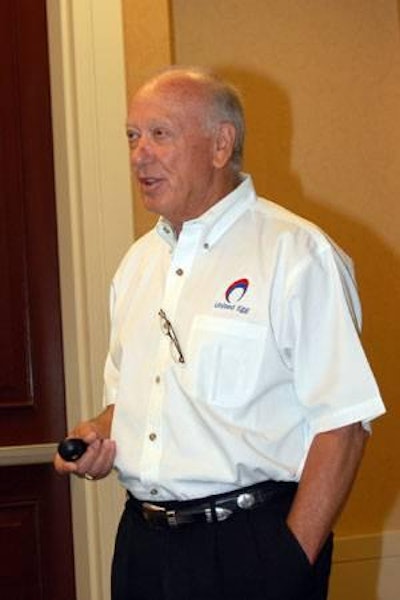
The United Egg Producers used its area meetings in late August to educate its members on the details of the agreement the organization negotiated with the Humane Society of the United States, and to seek feedback from rank-and-file members. At the Area 5 meeting in Atlanta, Gene Gregory, president and CEO, UEP, explained the process undertaken to negotiate the agreement and presented the timetable for implementation. Other topics were also addressed at the meeting, but the UEP-HSUS agreement dominated the discussions in the meeting room and in the hallway.
Seeking common ground
HSUS has been committed for years to getting laying hens out of cages, but Gene said that UEP got a tip that Wayne Pacelle, president, HSUS, might be interested in talking to UEP about enriched colony enclosures as an alternative to traditional cages for layers. In March of 2011, Chad Gregory, senior vice president, UEP, had a first meeting with Pacelle at which he raised a number of questions with HSUS. According to Chad, UEP wanted to know if HSUS would accept enriched colony housing, whether conflicts over state legislation and ballot initiatives could be resolved, whether a standard for housing for California’s Proposition 2 could be agreed to, whether HSUS would withdraw the ballot initiative for Washington State, and whether HSUS would drop future lawsuits and undercover investigations. At this meeting, Chad said that several “deal points” were identified.
In April, UEP executive committee members were apprised of the deal points negotiated with HSUS. These deal points were approved by the executive committee and a decision was made to hold further discussions with HSUS. Gene said that the vote to approve the deal points was around 20-10 in favor, which he said was typical of all of the votes UEP held at each step during the negotiations. At the UEP Legislative meeting held in May in Washington, D.C., the deal points were shared with the board of directors and UEP members in attendance during a producers-only meeting; allied members of UEP were not allowed to attend. During this session, a motion was passed calling for UEP to petition the federal government in cooperation with HSUS to transition the industry to enriched colony housing.
Throughout May, June and July, negotiations with HSUS continued, according to Gene, through a series of face-to-face meetings and conference calls. UEP chairman Bob Krouse appointed a special advisory committee, with many animal welfare committee members on it, to offer counsel during the negotiations. Gene said that a series of conference calls and meetings were held with the special advisory committee, and that the board of directors had five conference calls and two face-to-face meetings. He reported that votes after each meeting called for UEP to continue exploring possible agreements with HSUS.
Signing the agreement
The negotiations faced an important deadline in early July, Gene said. The deadline for HSUS to submit the names they had collected for the ballot initiative in the State of Washington was July 8. He said that if UEP wanted to avoid another situation like it faced in California, the agreement needed to be completed before July 8, and it was (see boxes for explanation of timelines and details of the UEP-HSUS agreement).
On advice of legal counsel because of pending antitrust litigation, Gene said that the particulars of the negotiations could not be shared with all UEP members until the agreement was made. “We would have loved to have everyone involved in the process, but we couldn’t because of antitrust concerns,” Gene said. “Advice from council said this was necessary.”
Producer feedback wanted
Now that the details of the agreement can be shared with everyone, Gene asked that members submit questions and comments to UEP. He said that everyone needs to pull together and help lobby for the agreement to become law. UEP and HSUS will ask Congress to amend the Egg Products Inspection Act to include the language of the agreement and to make this amendment part of the 2012 Farm Bill. The goal is to have legislation passed by June 30, 2012, and if not by then, before the next Congress is sworn in.
Gene said, “If we don’t get the legislation passed, what are we going to do? We put $10 million into California (Proposition 2 campaign) and lost. Can we continue to spend millions of dollars to fight ballot initiatives?” He said that egg production in enriched colony housing is affordable and cage-free production is not. “Getting HSUS to accept enriched colony housing was a huge deal,” Gene said. “Our future is more certain now due to this deal.”




.jpg?auto=format%2Ccompress&fit=crop&h=167&q=70&w=250)













